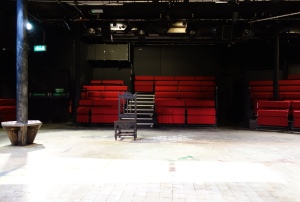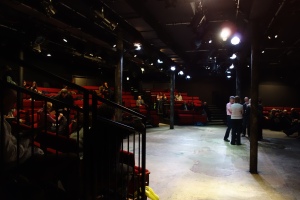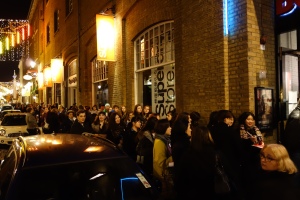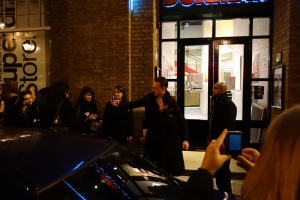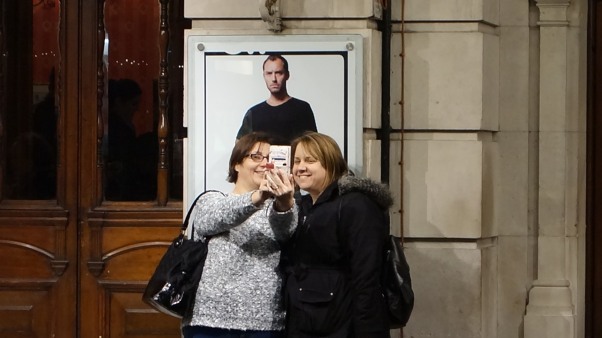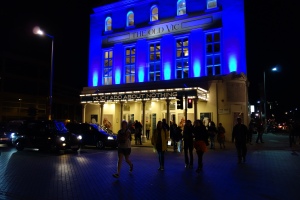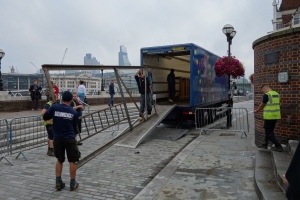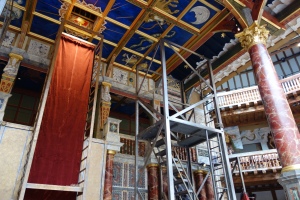Henry IV Part One, Royal Shakespeare Theatre, 3 May 2014
The production began on a very sombre note in a candle-lit chapel with Henry (Jasper Britton) prostrated before a large crucifix (1.1). As he began his complaint, the distinctive figure of Richard II appeared briefly on the stage left balcony, indicating that the source of Henry’s malaise was his guilt at usurping his predecessor. This also implied that his self-characterisation as “shaken” referred to his bad conscience about Richard rather than the “civil broils” that were his immediate concern. Henry was immediately brought to our attention as psychologically complex and with depth of feeling and conscience.
However, over in the Prince’s apartment the mood was somewhat different (1.2). The dark chamber contained a large bed, on which Hal (Alex Hassell) bade goodbye to two wenches who had just finished servicing him. One was already visible sat astride him, while a second emerged from under the sheets. Hal went to open the chamber shutters, the sudden noise of which woke Falstaff (Antony Sher), who popped up from under the bedclothes at the foot of the bed. This sudden intrusion of daylight prompted Falstaff’s question about the time of day and his insistence that he was one of the “gentlemen of the shade” rather than a daytime person. Hal opened the window and eventually put a shirt on.
Antony Sher’s Falstaff sounded like the kind of upper-middle class gentleman that haunts the expensive seats at the RSC. It was possible to imagine him preparing for the role by drawing on decades of memories of rubbing shoulders with the Warwickshire/Oxfordshire bourgeoisie.
With the arrival of Poins (Sam Marks), the three agreed to rob at Gad’s Hill (pronounced “Gade’s Hill”). Hal was very excitable throughout the conversation but this changed when he was left alone at the end of the scene.
Hal’s soliloquy was framed in dramatic spotlight centre stage as he addressed the audience in a particularly portentous way with his master plan to live dissolutely and then abruptly revert to virtue. This was first indication of the emphasis that Part One would place on Hal’s change of attitude to Falstaff, together with Hal’s general transformation. Rather than an explanatory footnote to the scene, the speech was a foreboding of dark events to come.
Henry met with the rebels (1.3). The staging emphasised royal power with Henry facing the audience sat on the throne backed by his supporters while the northern insurrectionists kneeled before him. This created an obvious imbalance of status and power quite unlike the semicircle of chairs used in the Globe production.
The bleached blonde Hotspur (Trevor White) immediately looked like trouble. Anger and aggression boiled to the surface. A letter was thrown back into Hotspur’s face and the king rudely shouted at him that he did “belie” Mortimer.
This roughness and tension continued once Hotspur was alone with his relatives. When Hotspur would not stop talking he was wrestled to ground, forcing from him an apology “Good uncle, tell your tale; I have done”. Hotspur insisted on pursuing a course of revenge until he was pulled by the hair on the back of the head and told by Worcester (Antony Byrne) to follow his letter-borne instruction.
The action switched to Rochester as the carriers (Nicholas Gerard-Martin & Robert Gilbert) gathered in the darkness with their lanterns (2.1). A neat piece of technology allowed the turkeys inside their baskets to make realistic gobbling noises. The character usually known as Gadshill was here called Rakehell (Jonny Glynn) and received confirmation from the Chamberlain (Simon Yadoo) of the movements of the intended targets of the robbery.
The more active robbers ran around hiding from Falstaff and teasing him as the heist was prepared (2.2). Hal fell to the ground to listen for approach of the victims, prompting Falstaff’s joke about the levers that would be required to lift him from that position.
The nuns and the carriers were assaulted. The robbers took the money chest and tried to open it with a hacksaw, while Hal and Poins crept up on them in hoods and facemasks. The robbers were surprised and ran off, with Falstaff not even attempting to fight.
Hotspur was annoyed at a weasel-worded letter refusing him assistance (2.3). He threw it to the ground and shouted at it before being intercepted by Lady Percy (Jennifer Kirby). She was a good match for her husband, with the vague air of a tough man’s wife.
She wanted to know why he had been ignoring her. He began to leave but turned back when she mentioned that she had watched over him while he was asleep. She continued to talk sweetly to him and he almost fell for her charms, but then suddenly pulled away to question a servant.
Lady Percy then tried a more direct physical approach and went to grab his little finger, but he wrenched her arm and forced her to the ground, so that she was lying there when she asked him “Do you not love me?” He responded to this by picking her up and holding her aloft with one arm.
The Eastcheap set (and those of other locations) slid sideways onto the stage rather than using the basement trap doors (2.4). This was to make them compatible with the Barbican theatre and other touring venues. It seems that the RST has been fitted with basements and fly towers that cannot be used with its major productions that transfer to London and beyond.
Hal told Poins about his mixing with the common people, whom he jokingly referred to as “Tom, Dick (Harry) and Francis”, the extra name being thrown in case we had not realised what the expression meant.
Returned from his ignominious failure at Gad’s Hill, Falstaff began his fantastical account of the robbery and its aftermath. Hal raised a drink in cheers to the audience, indicating that he would indeed contradict Falstaff’s story for our imminent amusement. Hal stood on the money box to demand Falstaff’s excuse for his arrant lying.
Doll (Nia Gwynne) was present in Eastcheap in Part One, and touched Falstaff affectionately on occasions, preparing us for the full display of their relationship in Part Two.
Moving on to the play extempore, a chair was placed on a table to serve as a throne, while another chair was placed on a table just opposite. Falstaff repeatedly asked if Hal was afraid of the impending fight with the rebels and repeatedly put his hand on Hal’s shoulder, which the prince brushed off.
The comical role play between Falstaff and Hal moved to portentous conclusion. Hal said of Falstaff’s banishment “I do; I will”. At first he was jovial, but then placed his hands firmly on the armrests of the chair and appeared to have a change of heart, brushing a hand through his hair as if regretting his pronouncement. This was followed by Macbeth-like banging at the door.
Hal slapped the Chief Justice (Simon Thorp) when he came looking for Falstaff and Bardolph (Joshua Richards). This served to underline the animosity between the two. This invented business was included because of the subsequent references to the assault in Part Two.
Over in Wales, Hotspur thought he had forgotten the map on which the rebels were to divide their spoils, but Glendower (Joshua Richards) had pulled the huge map in behind him as he entered (3.1).
Glendower looked and sounded just like Sam Cairns’ version of the character at the Globe in 2010.
The King had summoned Hal for a serious talk (3.2). Hal began his excuses for his behaviour, but was pulled by the ear by the King towards the chapel kneeling pad. This marked the turning point at which Hal realised exactly how seriously his father took the issue of his behaviour. If the idea was latent when he had spoken to us earlier in soliloquy, this was the moment that he decided to act on his intentions.
In Eastcheap, Falstaff emptied dregs from abandoned cups into his own, displaying mild signs of delirium tremens (3.3). The speech in which Falstaff described his virtue but ironically undercut each statement with a humorous caveat was here divided between Falstaff and Bardolph so that his companion was the source of the more honest version rather than Falstaff himself. The advantage of this staging was questionable.
A running joke extended across both productions in which all references and allusions to Quickly’s husband and her married status were followed by communal coughing. In Part Two this accompanied references to Quickly (Paola Dionisotti) being a widow.
The inconsistency of the production’s modernisation of language could be seen in the way that the reference to “dowlas” was changed to “muslin”, but the price reference “eight shillings an ell” was left in. An audience trusted to work out that an “ell” is a unit of length could also be trusted to determine that dowlas was a cheap fabric.
Despite his realisation in the previous scene that his relationship with Falstaff had to change, Hal was here still in a good mood with Falstaff as he gave him his battle orders.
Falstaff’s last words in the scene “I could wish this tavern were my drum” were rounded off with the sound of drums heralding the entry of the more reliably martial Douglas (Sean Chapman) and Hotspur (4.1).
Hotspur continued his manic preparations for war brushing aside any concerns that their forces were underpowered.
On his way to fight the rebels, Falstaff asked Bardolph to fill a bottle of sack for him, which when handed over was seen to be comically enormous (4.2).
In an initial sign of his displeasure with Falstaff, Hal was visibly appalled at the condition of his pressed soldiers. Hal could also be seen taking exception to Falstaff’s callous attitude to these men deemed merely “food for powder”.
Hotspur was still raring to attack the King’s forces (4.3). Blount (Simon Thorp) brought an offer of pardon but Hotspur responded by lecturing him at length about the severity of their grievances.
Blount asked “Shall I return this answer to the King?” In a clever tweaking of the text, the following lines, in which Hotspur appears to relent “Not so, Sir Walter. We’ll withdraw awhile”, were given to Worcester. The sequence turned into Worcester being conciliatory, holding back Hotspur and calming his rage, while the young rebel continued to glower with frustrated anger.
This created consistency. Given how eager Hotspur was, the text’s version in which he made the concession looked out of character. It also created a parallel with events in the next scene.
At Shrewsbury Worcester met with the King and his party, including Hal (5.1). In a parallel with the Hotspur/Worcester sequence in 4.3, the King had to restrain Hal from offering to fight with Hotspur in single combat.
Hal showed a new censoriousness towards Falstaff by ordering him to be quiet and refrain from his inappropriate wisecracks. This textual indication of Hal’s changed attitude fitted in well with the other more subtle indications of Hal’s transformation created by directorial decisions.
Hal maintained that the peace offer would not be accepted, exuding an air of foreboding and intimating that the King’s judgment was wrong.
Given his previous pronouncements it was possible to detect some wishful thinking in Hal’s parting words to Falstaff: “Say thy prayers, and farewell” and “Why, thou owest God a death”. His wish was truly father to those thoughts.
This led into Falstaff’s “honour” soliloquy in which he showed us the scutcheon on his buckler to illustrate one of his metaphors.
Worcester decided not to tell Hotspur about the peace offer, realising that the King would inevitably find a way to punish their disobedience (5.2). Hotspur predictably whooped with delight when he heard that the fight was on.
In the midst of the raging battle a desperate Hal asked to borrow Falstaff’s sword (5.3). He offered him his pistol instead, handing over a leather container. Hal discovered that it held yet another bottle of sack, which he angrily discarded, building on his previous animosity to become truly outraged at Falstaff’s inappropriate antics.
Douglas fought the King to the ground, but Hal rushed in to stand over his father, threatening the Scot with his sword, after which Douglas skulked away (5.4).
There was a fantastically fast double sword fight between Hal and Hotspur. Hal lost both his swords and ended up defending himself with his buckler. He regained a sword and was given a second one, continuing to fight without a buckler. Hal eventually dealt Hotspur fatal blows to the stomach. Just before, Falstaff had apparently been cut down upstage and was lying motionless.
Hal honoured Hotspur in death, holding his sword hilt over him and paying him his due respects. Then Hal found Falstaff and did the same but with a subtly different emphasis.
Hal’s contemplation of the supposedly dead Falstaff culminated in him raising his sword over his body, looking as if he would honour Falstaff with praises as he had just done with Hotspur. But he hinted that he was not displeased to see his companion dead, saying: “O, I should have a heavy miss of thee if I were much in love with vanity”, which was crucially caveated; speaking of the battle dead he referred to those other than Falstaff as the “many dearer”.
This was undercut when Falstaff rose up. At first he struggled to right himself, wobbling like beetle on its back. When Hal saw Falstaff alive he took a step backwards in shock and pointed his sword at him as if he were a demonic illusion. Hal ordered Falstaff to carry Douglas away on his back.
This was a very interesting trajectory for the Hal/Falstaff relationship because it effectively cleared the way for the friendlier rapport between them at the start of Part Two.
The concluding scene saw a large map spread out on the stage on which the King, victorious over his immediate enemies, was planning his further campaigns against the rebels (5.5).
Henry IV Part Two, Royal Shakespeare Theatre, 3 May 2014
The “switch off phones” announcement merged into an exhortation to “Switch off your phone… open your ears”, the latter phrase being the first three words of the Induction to Part Two. The remainder was spoken by the character of Rumour (Antony Byrne), a man looking like a member of the stage crew complete with a Rolling Stones tongue logo t-shirt, picking up on the line “upon my tongues continual slanders ride”.
Rumour used his phone to photograph the audience and the set, then began his speech as multiple copies of the #rumour hashtag were projected onto the back wall, establishing a connection between traditional rumour mill and contemporary social media. The phrase “Open your ears” was also flashed across it and spoken in several languages.
After Northumberland (Sean Chapman) had digested the news of his faction’s defeat and the death of Hotspur (1.1), the mood and location changed.
Falstaff was proudly displaying the medal he had won for his services at Shrewsbury when his Page returned with his water pot (1.2). The boy was very small, justifying Falstaff’s description of him as “fitter to be worn in my cap”. The Page mentioned that Hal had struck the Lord Chief Justice, which to create consistency across the productions had been shown in Part One.
Sher continued his impression of the kind of upper middle class gent so common in the audience at Stratford.
The boring, featureless exposition of 1.3 quickly gave way to some more London-based comedy as Quickly gave Fang (Youssef Kerkour) and Snare (Martin Bassindale) their last-minute instructions about arresting Falstaff (2.1).
There was a brilliant moment of textual awareness. Mistress Quickly mentioned in all innocence her “case so openly known to the world” upon which Fang and Snare each gave a brief downward glance to bring out the sex joke in that line. In keeping with that theme, Quickly was also referred to as “Quick Lay”.
The fight in which Fang and Snare failed to detain Falstaff was not very convincing and was interrupted by the arrival of the Chief Justice, the ensuing dealings with Quickly providing another outing for the running joke about her marriage, this time with everyone coughing at her being a “poor widow”.
Hal and Poins returned from playing tennis and stood around shirtless for a while before getting dressed (2.2). Hal’s reminder of a point already made briefly by Falstaff, that the Page had been a gift from Hal to him, was a sign that their friendship had been rekindled. But the first mention of Falstaff’s name caused Hal to look down at the ground grimly, hinting that all was not completely well.
The arrival of Bardolph and the Page was the occasion of some more winsome child acting. Bardolph was paid money for his silence about Hal and Poins’ trick on Falstaff, but the Page stole the cash and ran off, turning his last phrase in the scene “I will govern it” into his bold statement as he snatched the money bag away from his companion.
The scene showing Lady Percy’s misgivings about Northumberland’s intention to return to war was remarkable for the fact that Nia Gwynne (Doll Tearsheet) played Lady Northumberland in a change to the usual doubling of this role with Mistress Quickly (2.3).
The action returned to Eastcheap, where once again Francis (Elliot Barnes-Worrell) popped up out of the trap door hatch, calling “anon anon, Sir!” to an impatient, unseen customer (2.4).
The private room where Falstaff was being entertained was laid out on a small platform. This looked like another concession to the requirements of touring the production. On first sight, it looked cramped and would prove so later on. The confinement of the scene’s action within such a small space on the large RST thrust looked very odd.
Nia Gwynne’s Doll was sick into a bowl and comforted by Quickly. Falstaff insisted that Pistol (Antony Byrne) be admitted, confirming “It is mine ensign” rather than “ancient”.
Pistol was wide-eyed and with his hair on end to create an alarming look. He entered with a bang as his pistols went off and engaged in his sexual innuendoes.
Doll forced Pistol down onto the ground, but he soon overcame, putting a knife to her throat exclaiming “Have we not Hiren here?”
Seeing that Doll was in danger, Quickly disarmed him as he commented “These be good humours”. Pistol went from the threatening to the ridiculous. He dropped his trousers and after Doll suggested he should be thrust downstairs, he lewdly asked “Thrust him? Downstairs?” looking at his bulging underpant codpiece.
Pistol wrapped the Eastcheap crew up in a curtain and pulled on it like reins to curb them like “pampered jades of Asia” before being forced out the back of the small set.
Doll questioned Falstaff about Hal and Poins: each of them popped their head up over the rear curtain when mentioned.
They eventually played their trick by pretending to be servers. The first meeting between Hal and Falstaff contained a slight undercurrent of animosity, but nothing to overt dislike on Hal’s part.
Falstaff was called to the court and left the room platform, but paused on the main stage to cry silently with his face in his hand, an extratextual moment. Bardolph saw this and returned to the room to fetch Doll, which is part of the text. She comforted Falstaff in his distress, providing additional weight to the tenderness of their relationship as well as highlighting the vulnerability behind Falstaff’s boasting. The whole sequence provided a neat explanation for Doll’s summons.
Mistress Quickly fell asleep in a chair and the room fell dark and silent.
The third act followed on seamlessly from the previous scene. Wrapped in a dark sheet and looking distinctly unwell, the King entered through the back of the Eastcheap platform as Quickly dozed. His lines to the Page cut.
Henry entered the world of Eastcheap so that when he spoke to us saying “How many thousand of my poorest subjects are at this hour asleep!” he was able to point to Quickly as an example as she snored.
The King walked off the front of the platform to move downstage, which differentiated him from the others who had all left the room through its back door. This suggested that his presence here was illusory: that he was theatrically but not physically inside an Eastcheap tavern.
The interval came at the end of the scene after the King had spoken with Warwick and Surrey about defeating the rebels.
The second half began in Gloucestershire, the refreshed audience encountering the delightful Oliver Ford Davies as Shadow conversing with Silence (3.2). Silence (Jim Hooper) was wearing mittens like a child and was equally childlike in his ignorance, or rather forgetfulness. Shadow asked various questions about their mutual friends and relations, but senescent Silence did not seem to know whom he was talking about.
There was a running gag involving Shadow’s leg shaking whenever he became excited. He first began to tremble when reminiscing about the “bona robas” of his student days, and subsequently when remembering Jane Nightwork a little while after.
The pressed men appeared: Mouldy (Simon Yadoo) was diseased, Wart (Leigh Quinn) crept along the ground and Bullcalf (Youssef Kerkour) was predictably big.
In another annoying textual change, Mouldy said “If it please you” rather than the equally comprehensible “an’t”. If a production starts running scared of the language, then where does it stop?
Bullcalf’s self-correction of his illness from “cold” to “cough” was made to sound like the actor correcting a misremembered line, an effect that was cleverly rendered.
Falstaff managed to leverage the full quotient of innuendo from his exhortation “No more of that Master Shallow…”
Wart was given a gun but could barely hold it upright. Shadow demonstrated its correct use and charged around brandishing it threateningly, ending his display of martial prowess by striking the butt firmly on the ground, at which point the gun went off.
Falstaff communed with the audience, telling us about Shadow’s youth when he was known as “Mandrake”, a remark which prompted a ripple of laughter that Falstaff gratefully acknowledged. He appeared to have found the audience’s level when they snickered at his comment that “he came ever in the rearward of the fashion” with more chortling and Falstaff relishing his apparently unintended double entendre.
Westmoreland (Youssef Kerkour) tricked the rebels into thinking their demands had been met and that they had won (4.1), only for John of Lancaster (Elliot Barnes-Worrell) to confirm the deal, watch the rebel army disperse, and then arrest the traitors (4.2).
Coalville (Robert Gilbert) had been mentioned by name in an earlier scene to give more credence to his sudden appearance in 4.3 as Falstaff helped mop up the remainders of the fleeing rebel forces.
Falstaff called out after the departing John of Lancaster “I would you had but the wit”, making plain his dislike of Hal’s cold-blooded sibling.
This thought led Falstaff into his great paean to sack and its warming, inflammatory effects. He took a deep draught from a clay pot before expounding on each element of its “twofold operation”.
Antony Sher revelled in exploring the physicality of Falstaff’s reaction to sherry. This portrayal was different to that given by Roger Allam in the Globe version, which was slightly more clinical.
The text’s “sherris” was emended rather disappointingly to “sherry”. Sherry is something that is drunk at Christmas, usually in a modest, restrained way. Gourmand Falstaff should really drink something more exotic and tinged with his characteristic wildness, and the word “sherris” fits the bill perfectly.
To add insult to injury, the culmination of Falstaff’s fine speech was also pinched and clipped to deprive it of its full glory. We were left with:
If I had a thousand sons, the first [humane] principle I would teach them should be to [forswear thin potations, and to] addict themselves to sack”.
A beautifully balanced phrase was spoilt by the clumsy hand of the editor.
The King looked very ill and was helped in by his entourage. His surprising reaction on hearing the good news of the rebels’ defeat was to collapse sideways, before being carried to rest in another chamber (4.4).
The King was put to bed with the crown next to him (4.5). The scene provided an efficient but predictable staging of Hal’s appropriation of the crown and his subsequent contrition.
Shallow continued to entertain Falstaff and friends (5.1). Shallow’s repetition of “no excuse” was accompanied by the repeated unloading of money bags, presumably either their pay for recruiting men or bribes paid to them to be excused from military service.
News that the King had “walked the way of nature” was soon followed by the new king being revealed on his throne (5.2). This dramatic reveal was very effective, much more so than having him walk onstage. The text added a reference to the Chief Justice being assaulted: he stated that Hal had “struck me in an Eastcheap tavern” rather than the original “my very seat of judgment”.
Mad Pistol delivered the news of Hal’s accession which was received with great joy by Falstaff (5.3). There was a touching moment at the end of the scene once the stage had emptied of those keen to get to London, Pistol sat with Silence and began to sing “Where is the life that late I led?” and Silence, who had previously been on good singing form, joined in with him.
The arresting officers crudely snatched and discarded the red cushion that Doll had stuffed up her dress to fake a pregnancy and thus escape the law (5.4).
Falstaff readied himself centre stage as the regal procession entered via the stage right walkway and proceeded upstage (5.5). The King entered and walked on past the entreating Falstaff, but then turned round, looked back at his old friend and denounced him. Falstaff showed no sign of upset or shock. Possibly this was recognition and he was just saving face in front of the others.
As we were left to take in the culmination of the subplot, the Page wandered onstage at the end as the lights went down.
Conclusions
The overall trajectory of the Hal/Falstaff relationship was determined by the relative lack of interaction between them in Part Two, so that Hal’s overt statements in Part One were heavily reinforced by subtle hints throughout both parts, preparing the way for his renunciation of Falstaff at the end of the second instalment.
Neither production made use of the Royal Shakespeare Theatre’s fly tower or basement lift, possibly to facilitate Barbican transfer. If this is to be the pattern for major productions, which have to fit the Barbican, then what was the point of these impressive capabilities?
